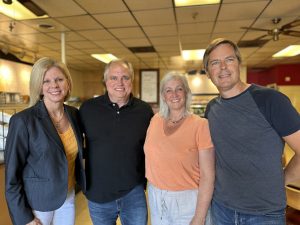Billy Hayes’ story is likely a familiar one.
In 1970, Hayes was arrested in Turkey for smuggling hashish, and after five years in prison, he escaped in 1975. He chronicled this experience in his book “Midnight Express,” published in 1977, which was made into an Oscar-winning movie of the same name, directed by Alan Parker and with a screenplay by Oliver Stone, a year later.
The story has also been told on the National Geographic series “Locked Up Abroad” and via Hayes’ one-man show, “Riding the Midnight Express with Billy Hayes,” which premiered in 2013.
Hayes returned to Turkey in 2007, which was captured by writer and director Sally Sussman Morina in the documentary “Midnight Return: The Story of Billy Hayes and Turkey.” The film features interviews with Hayes’ family, friends, former inmates of the prison and the filmmakers of “Midnight Express.”
Hayes and Sussman will host the screening of “Midnight Return” at the Hot Springs Documentary Film Festival and take part in a Q&A on Saturday, Oct. 8 at 12:20 p.m.
We spoke to Hayes from his home in Las Vegas about the documentary and what he hopes audience will take away from it.
How did “Midnight Return” come about?
The woman who wrote and directed the film, Sally Sussman [Morina], is married to an old friend of mine who I went to acting school with like 30 years ago. One night, I was over at their house, and I mentioned how much I wanted to go back to Istanbul.
I always wanted to go back to Istanbul. If you’ve seen the movie [“Midnight Express”], you have one impression of Turkey and the Turks and my situation, which isn’t the best because the film paints a very dark picture of the whole country. This is my biggest problem with the movie “Midnight Express.”
Turkey’s tourism dropped 95% in 1978 when the movie “Midnight Express” came out. To this day, they’re dealing with the weight of that.
Sally heard me say I wanted to go Istanbul. It’s the city of my boyhood dreams. I actually went there smuggling hashish, which is marijuana for those who don’t know, three times prior to getting arrested on my fourth trip. I loved Istanbul. I got a long great with the Turks. You don’t see that in the film.
What is the focus of the documentary?
When I said that I would love to go back to Istanbul, Sally said, “Really, why?” And, I started to tell her that I loved the city. It’s an amazing place. I didn’t like the prison, but that’s true of anywhere you get arrested.
That idea was in her mind and it led to another. She wanted to do a documentary about me and the whole story for about 10 or 12 years.
She [also] followed me to various acting jobs and directing jobs, and, then eventually, in 2007, we got to go back to Istanbul. Sally and [her husband] Tony came with me to film. That is sort of the highlight of the documentary.
Sally wanted to talk about the power of film and use “Midnight Express” as an example of how powerful film can be and how it can affect people and countries and international relationships. She made a brilliant film. She took my little story and made a much bigger idea out of it — the power of film.
Why did you want to have your return to Istanbul documented?
I’d always wanted to go back. People had talked to me about doing some sort of reality show. I hate all [reality shows]. Some people mentioned having me go back to Turkey would be a key element with this. That’s when I first started talking to Tony and Sally about wanting to go back.
Sally is a storyteller. The story intrigued her, and the more we got into it, the more it intrigued her. I’m looking at it from the inside, and she’s looking at it from the outside and how Turkey was affected, how films are made and why people make the choices that they do in the making of a film.
What did you think when you saw the film, and how have audiences responded?
It’s been amazing. People love the documentary. Turkish people have come up to me and said, “Thank you for setting the record straight. Thank you for making us look like real human beings as opposed to caricatures.”
When I finally got to see the film, it was incredible to me. I got to see some people who were in prison with me. To hear them talk about the experience from a different point of view, it was kind of overwhelming. It’s a very powerful piece.
I like the response we’ve gotten from Turkish people and the Turkish press. The documentary helps balance the imbalance that they had to live with after “Midnight Express.” That movie was emotionally very accurate, but factually they made a lot of changes.
The documentary helps balance that view. There are a lot of Turkish people in the film talking about “Midnight Express” and how it impacted them and their lives and their children.
Many people know your story. What do you hope they take away from the documentary?
That there’s a much bigger story than perhaps they were aware of, depending on which iteration of my life they know. If they read my book, they have a very different opinion than if they had just seen the movie. Or, they may have seen “Locked Up Abroad” — they did a very nice job. It was much more accurate, because I was able to tell my story in my own words.
[The documentary] helps balance things, and that helped create such an interest in my one-man show.





